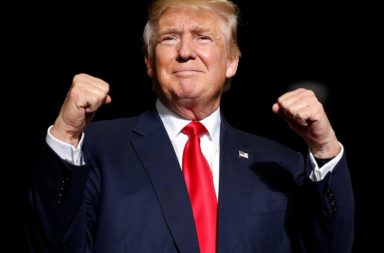Donald Trump becoming president is officially a top-risk event that could destabilize the US economy and put the country at a heightened risk of terrorist violence, according to a report released by the Economist Intelligence Unit.
A sister-organization to The Economists and a well-respected and esteemed organization in its own right, the Economist Intelligence Unit (EIU) ranked Mr. Trump as a Top 10 risk to global security in a list it published on Wednesday. Other risks on the list include the possibility of the UK voting to leave the EU, a sharp downturn in the Chinese Economy, and Russian intervention in Ukraine and Syria creating “a new cold-war”.
Respected Republican foreign and security affairs experts warn about Trump as a risk for America.
Would you give him an atomic bomb or the red button in his hands- and sleep well?
Make America Great Again?
All of this begs the question: How terrified should you actually be about the possibility of a Donald Trump Presidency?
As it turns out—you should be very, very afraid.
According to the EIU, a presidential win for Donald Trump ranks on par with “the rising threat of Jihadi terrorism destabilizes the world economy.”
Given Trump’s “exceptionally right-wing stance” on the Middle East, it is likely that his inflammatory rhetoric that heralds the killing of the families of terrorists and a blanket ban on all Muslims into the US would be used as recruitment tool for jihadist groups. This would lend additional legitimacy and strength to these groups, increasing their presence inside and outside of the region. The global risk briefing manager at the EIU, Robert Powell, puts it more succinctly saying, that Trump would be a godsend to “potential recruiters who have long been trying to paint the U.S. as an anti-Muslim country. His rhetoric will certainly help that recruiting effort.”
Trump’s hostile attitude towards free-trade could likely lead to a trade war between the US, Mexico, and China. In recent months, Mr. Trump’s rhetoric about trade between Mexico and China has been so hostile that it would be possible for him to alienate the two countries. This is true, quite specifically, of the new Transatlantic Trade and Investment Partnership (TTIP) which is a trade deal that was signed by the US and 11 other Asian and American states this February. The risk to US diplomatic relationships looms large if the Trump’s hostile attitudes aren’t tempered in the policy-making process.
The inclusion of Donald Trump to the EIC’s global risk list marks the first time that the election of a political candidate was considered to be a geopolitical risk—a significant feat in and of itself. In an interview, Powell noted that “it’s highly unusual, and I don’t think we ever have done it where we’ve had a single politician be the center of our risk items.”
How Likely is, “Likely”?
Trump winning the US presidential election scores a risk factor of 12 out of 15 on the EIU’s global risk assessment scale. For a bit of perspective, the risk of the rising threat of jihadi terrorism destabilizing global markets also scored a 12 out of 15.
- The Number 1 risk on the report is a sharp downturn in the Chinese economy, scoring a 20 out of 25.
Other top risks include:
- Russian intervention into Ukraine and Syria causing a “new cold war” (16/25)
- Currency volatility culminating in an emerging markets corporate debt crisis (16/25),
- The fracturing of the European Union (15/25), and a Greek exit from the EU which would cause a split in the Eurozone (15/25)
Trump’s possible win in the White House was ranked above both Chinese expansionism causing an arms clash in the South China Sea and a collapse of investment in the oil sector causing a global shock. Both of these events score an 8 on the EIU’s scale, which is classified as a “low probability, high impact” occurrence.
Mr. Trump is ranked as a “moderate possibility, high impact” event, and the only reason that his campaign was not ranked higher is because analysts at the Economist Intelligence Unit think that his chances of winning are slim.
The writers of the piece noted that “Although we do not expect Mr. Trump to defeat his most likely Democratic contender, Hillary Clinton, there are risks to this forecast, especially in the event of a terrorist attack on US soil or a sudden economic downturn. It is worth noting that the innate hostility within the Republican hierarchy towards Mr. Trump, combined with the inevitable virulent Democratic opposition, will see many of his more radical policies blocked in Congress – albeit such internal bickering will also undermine the coherence of domestic and foreign policymaking.”
This assessment is a stark warning to the American electorate and congress alike. A win for Donald Trump is likely to push congress into a purely reactionary policymaking stance and to alienate both allies and enemies. The cost of “making America great again” could usher in a tough blow to US diplomatic relationships and world markets.
A Trump-induced Panic?
Recent months have seen Republican congressional leaders, such as Mitch McConnell and Paul Ryan, shooting down Trump’s inflammatory rhetoric. His popularity has also caused nervousness among the party leadership who doubt their own ability to reign in the candidate’s more bombastic character traits.
Around the world, governments are growing more and more concerned with his destabilizing influence on world politics and economies. The UK parliaments has even debated whether or not to ban Trump from being able to enter the country and Saudi Arabian Prince Alwaleed bin Talal has labeled him a “disgrace” to the United States.
Copyright ‘Trump-the new Dr. Strangelove‘ by globalo.com




